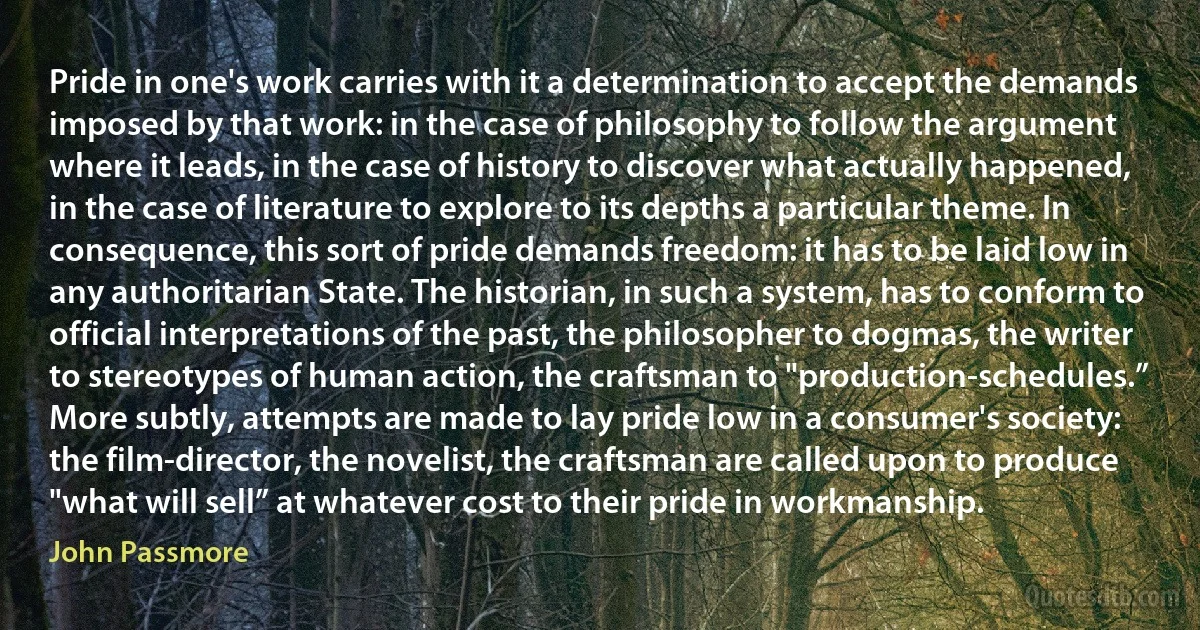
Pride in one's work carries with it a determination to accept the demands imposed by that work: in the case of philosophy to follow the argument where it leads, in the case of history to discover what actually happened, in the case of literature to explore to its depths a particular theme. In consequence, this sort of pride demands freedom: it has to be laid low in any authoritarian State. The historian, in such a system, has to conform to official interpretations of the past, the philosopher to dogmas, the writer to stereotypes of human action, the craftsman to "production-schedules.” More subtly, attempts are made to lay pride low in a consumer's society: the film-director, the novelist, the craftsman are called upon to produce "what will sell” at whatever cost to their pride in workmanship.
John PassmoreRelated topics
action argument case cost explore follow freedom historian history human lay low novelist past pride produce sell sort state theme whatever work authoritarianRelated quotes
Right thought is necessary to right conduct, right understanding to right living, and the Divine Wisdom – whether called by its ancient Sanskrit name of Brahma Vidyā, or its modern Greek name of Theosophia, Theosophy – comes to the world as at once an adequate philosophy and an all-embracing religion and ethic. It was once said of the Christian Scriptures by a devotee that they contained shallows in which a child could wade and depths in which a giant must swim. A similar statement might be made of Theosophy, for some of its teachings are so simple and so practical that any person of average intelligence can understand and follow them, while others are so lofty, so profound, that the ablest strains his intellect to contain them and sinks exhausted in the effort.

Annie Besant
Finally, we must think big and dream even bigger. In America, we understand that a nation is only living as long as it is striving. We will no longer accept politicians who are all talk and no action, constantly complaining, but never doing anything about it. The time for empty talk is over. Now arrives the hour of action. Do not allow anyone to tell you that it cannot be done. No challenge can match the heart and fight and spirit of America. We will not fail. Our country will thrive and prosper again. We stand at the birth of a new millennium, ready to unlock the mysteries of space, to free the Earth from the miseries of disease, and to harness the energies, industries, and technologies of tomorrow. A new national pride will stir our souls, lift our sights, and heal our divisions.

Donald Trump
I was to slowly discover that Savarkar was a bundle of contradictions and a historian's enigma. He simultaneously means many things to many people. An alleged atheist and a staunch rationalist who strongly opposed orthodox Hindu beliefs and the caste system and dismissed cow worship as mere superstition, Savarkar was also the most vocal political voice for the Hindu community through the entire course of the Indian freedom struggle.... A feted revolutionary who created an intellectual corpus of literature that inspired the revolutionary movement in India for decades, Savarkar was also a passionate and sensitive poet, a prolific writer and playwright, and a fiery orator. ...The social reformer in him strove to dismantle the scourges of untouchability and caste hierarchies, and advocated a unification of Hindu society.

Vinayak Damodar Savarkar
I have long known of Mr. Shaw, read his plays and prefaces, and loved him. I admire heroic effort. Accomplishment I love. What I am about to say is no invention, and I am putting it down for whatever it may be worth to the historian of literature and for the student of influences of men on men, and because it is true and must therefore be made known. As a boy, charging pell-mell through literature, reading everything I could lay hands on in the Public Library of Fresno, I found many men to whom I felt deeply grateful - especially Guy de Maupassant, Jack London, and H. L. Mencken - but the first man to whom I felt definitely related was George Bernard Shaw. This is a presumptuous or fatuous thing to mention, perhaps, but even so it must be mentioned.

William Saroyan
June 7, 1776, Richard Henry Lee, on behalf of the Virginia delegation, submitted to the Continental Congress three resolutions, of which the first declared that "these United Colonies are, and of right ought to be, free and independent States, that they are absolved from all allegiance to the British Crown, and that all political connection between them and the State of Great Britain is, and ought to be, totally dissolved. This resolution, which may conveniently be called the Resolution of Independence, was finally voted by the Continental Congress on the 2 of July, 1776. Strictly speaking, this was the official declaration of independence; and if we were a nation of antiquaries we should no doubt find an incongruity in celebrating the anniversary of our independence on the 4 of July.

Carl L. Becker
